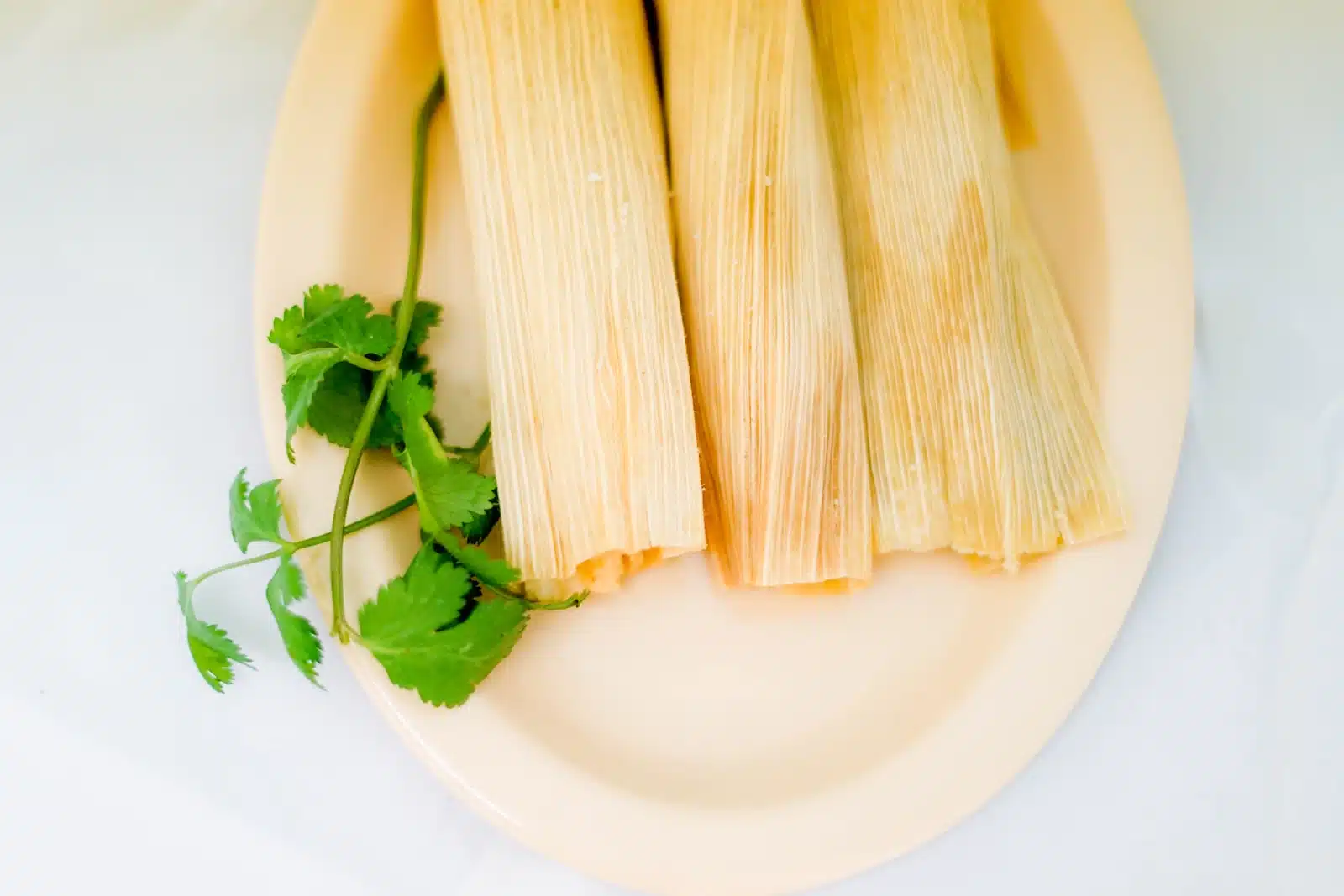Food storage is a critical part of keeping your meals safe and delicious, especially when it comes to favorites like tamales. Tamales are a traditional Mesoamerican dish made of masa, which is steamed in a corn husk or banana leaf. They can be filled with anything from meats to fruits and veggies. Knowing how long tamales last in the fridge is essential for enjoying them at their best quality and avoiding food waste. So, how long do tamales last in the fridge?
With proper storage, cooked tamales will be kept in the refrigerator for up to 5 days, while uncooked varieties stay good for as long as 6 months when frozen. If you’ve loaded your fridge with these tasty bundles, watch out for signs of spoilage, such as texture changes or unpleasant odors after several days.
To ensure longevity and freshness, seal them tightly in an airtight container or Ziploc bag before popping them into the fridge. And if you’re wondering about reheating your stored tamales, there’s no need to fret; options range from steamers to microwaves, ensuring they come out just right.
The way we store our food can significantly impact its shelf life and taste—tamales are no exception. Let’s unpack all you must know about keeping this delightful dish fresh so every bite feels like it’s freshly made.
Keep reading; there’s plenty more I’m excited to share with you about how long tamales last, even if they are fresh tamales in a freezer bag.
Key Takeaways
- Cooked tamales can be stored in the fridge for 4 to 7 days, but make sure they are tightly wrapped or sealed in an airtight container to keep them fresh.
- Uncooked tamales can last up to 6 months in the freezer. For best results, wrap them well with plastic wrap or aluminum foil and store them inside an airtight bag or container.
- To tell if tamales have spoiled, look out for signs like changes in texture, such as becoming slimy or mushy, any unpleasant odors, and discoloration on their surface.
- Reheating stored tamales can be done using various methods, including steaming them for about 15–20 minutes, using an air fryer at 325°F for around 10 minutes, or warming them gently in a rice cooker set to steam mode.
- When microwaving tamales to reheat them quickly, cover each tamale with a damp paper towel and heat on high for just enough time until hot throughout; usually this is between 1 to 2 minutes per single tamale.
Understanding Tamales
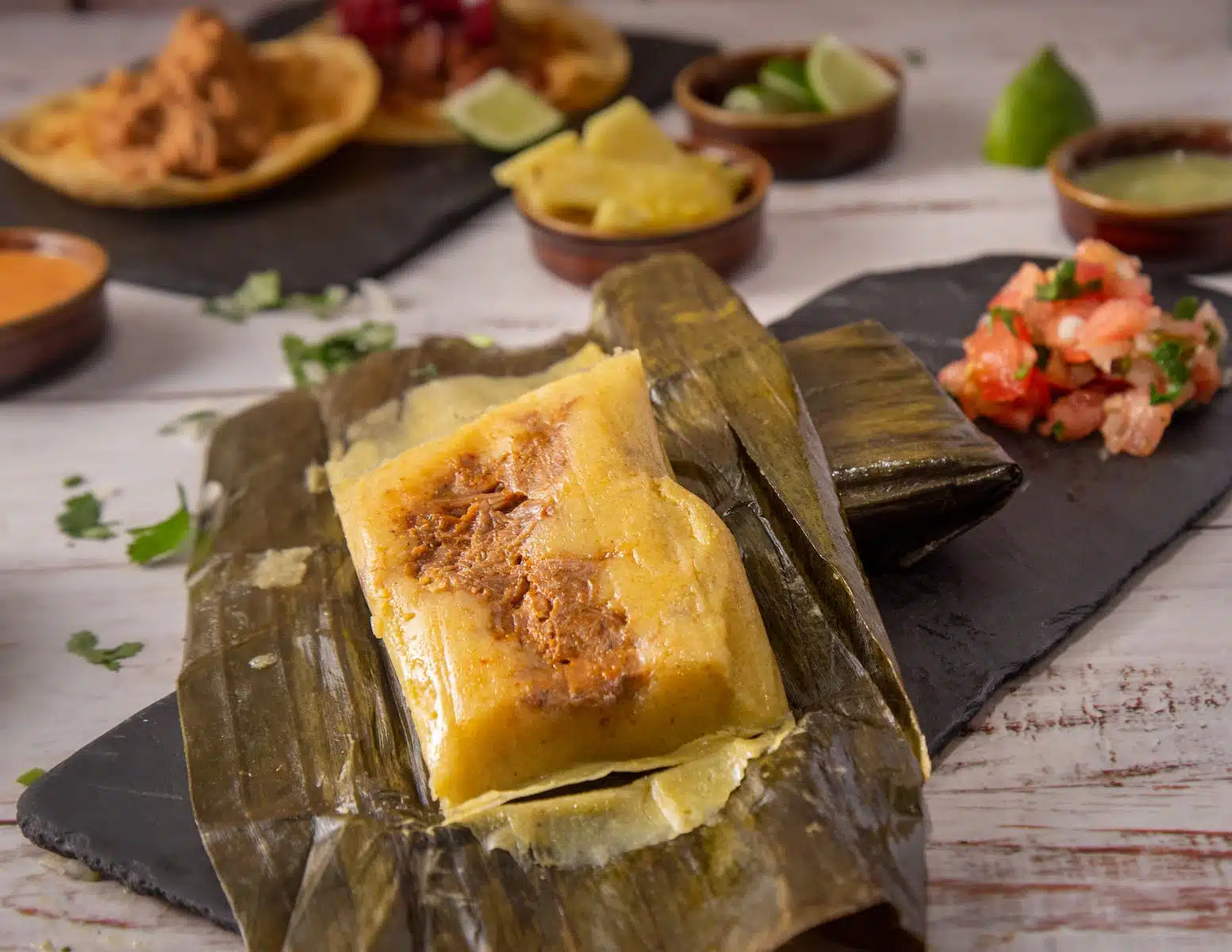
Tamales are a traditional Mexican dish made by wrapping a dough of masa (a type of cornmeal paste) around various fillings like meats, cheeses, fruits, or vegetables. The bundle is then encased in either a corn husk or banana leaf and steamed until cooked through.
This method not only imparts unique flavors but also creates compact packets perfect for storage. Since they’re often prepared in batches, knowing how to keep them fresh is key.
I take care when storing my homemade tamales to ensure they last as long as possible without losing their taste or texture. Wrapping them tightly helps prevent air from drying out the dough and preserves the deliciousness inside, whether it’s cooked or uncooked tamales I’m saving.
Proper preservation means I can enjoy these flavorful parcels well beyond their creation day—up to 5 days refrigerated if they’re cooked and an impressive 6 months frozen if uncooked.
Let’s move on to find out more about how fridge life affects your leftover tamales.
How Long Do Tamales Last in the Fridge?
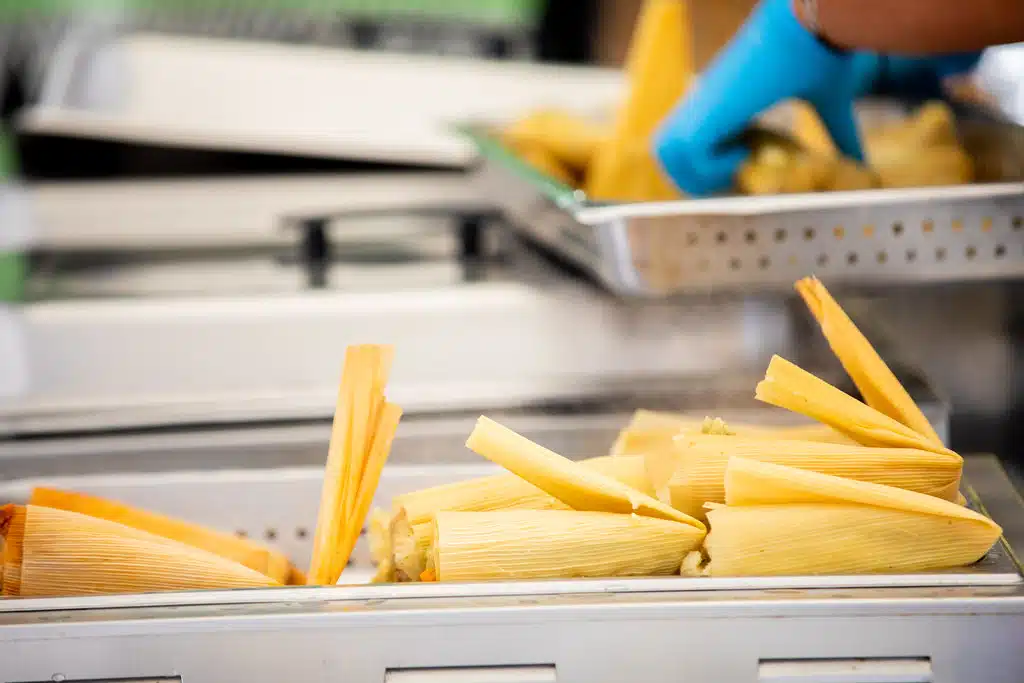
Cooked tamales can last up to 5 days in the fridge, while uncooked tamales can be stored for up to 6 months. It’s important to keep track of these timelines to ensure you’re consuming your tamales at their best quality.
Cooked: Up To 5 Days
Cooked tamales can be kept in the fridge for approximately 4 to 7 days when properly stored. Ideally, you should aim for 4 days max. Ensuring they are tightly wrapped or placed in an airtight container is crucial. This prevents air from reaching the tamales, which could lead to premature spoilage and affect their taste.
Storing cooked tamales in the refrigerator provides an opportunity to savor them over multiple meals throughout the week. However, it’s important to consume them within this time frame to reduce the risk of spoilage.
Utilizing airtight containers or wrapping them securely can help maintain their freshness and flavor during this period.
Uncooked: Up To 6 Months
Uncooked tamales have a longer shelf life compared to cooked ones, lasting up to 6 months in the freezer. To preserve uncooked tamales, wrap them tightly in plastic wrap or aluminum foil before placing them into an airtight container or Ziploc bag.
This method helps prevent freezer burn and keeps the tamales fresh for an extended period of time. It’s important to label the packaging with the date of preparation for easy tracking and consumption.
When storing uncooked tamales in the freezer, freezing them as soon as possible after preparation is essential to maintaining their quality over time. When it comes time to use them, ensure they are fully thawed before cooking for best results.
How to Tell If Tamales Are Spoiled?
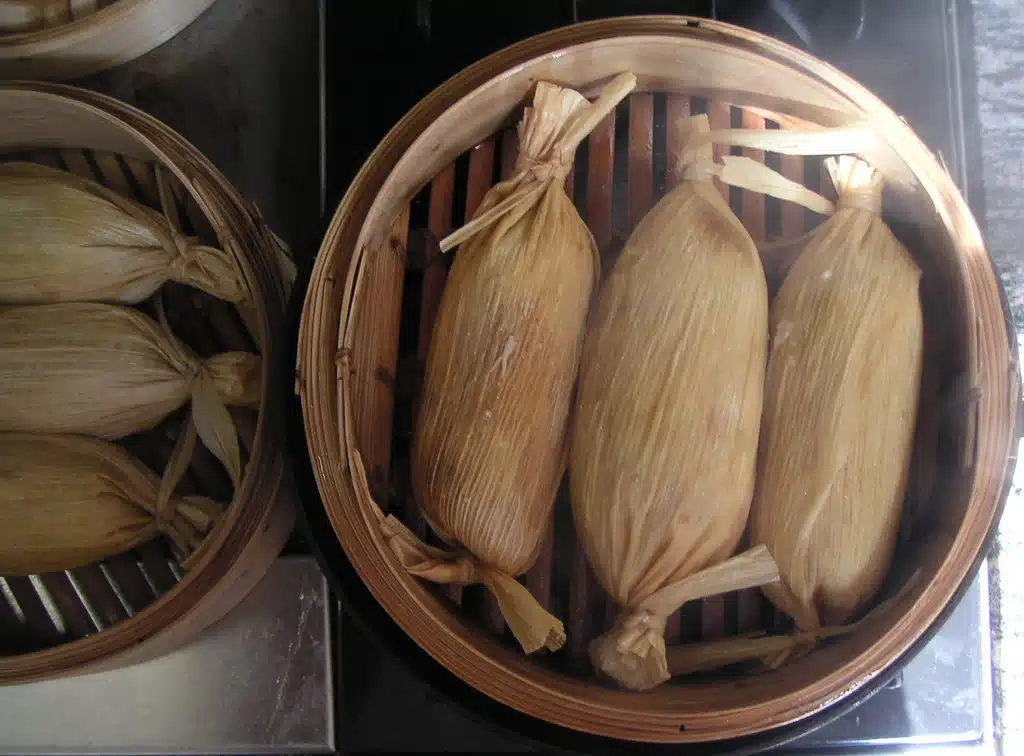
Changes in texture, an unpleasant odor, and discoloration are all signs that your tamales may have spoiled. If you notice any of these indicators, it’s best to discard the tamales to avoid foodborne illness.
Changes in Texture
The texture of tamales changes when they begin to spoil. You may notice a slimy or mushy texture, which is a clear indication that the tamales are no longer safe to eat. Another sign of spoilage is if the masa, or dough, becomes dry and crumbly.
When you see these changes in texture, it’s best to discard the tamales to avoid any risk of foodborne illness.
Additionally, spoiled tamales may develop a sour or off-putting scent. These odors can be an indicator that bacteria have started to grow on the tamales, making them unsafe for consumption.
Unpleasant Odor
If you notice the tamales giving off a foul smell, it is likely an indicator of spoilage. A strong, unpleasant odor can be a sign that the tamales have gone bad and should not be consumed.
Proper storage and refrigeration help prevent this from happening.
Storing tamales in airtight containers or wrapping them tightly can go a long way in preserving their freshness and preventing any unwanted odors. It’s important to keep an eye out for any strange or off-putting smells, as this could indicate that the tamales are no longer safe to eat.
Discoloration
Sometimes, discoloration can be a sign that tamales have gone bad. If you notice any unusual coloring, such as dark spots or patches on the surface of the tamales, it’s best to discard them.
This could indicate spoilage and potential foodborne illness if consumed.
Proper storage in airtight containers or tightly wrapped with aluminum foil can help prevent discoloration by reducing exposure to air and moisture. Additionally, using clean hands and utensils when handling tamales can reduce the risk of contamination and discoloration.
Tips for Properly Storing Tamales
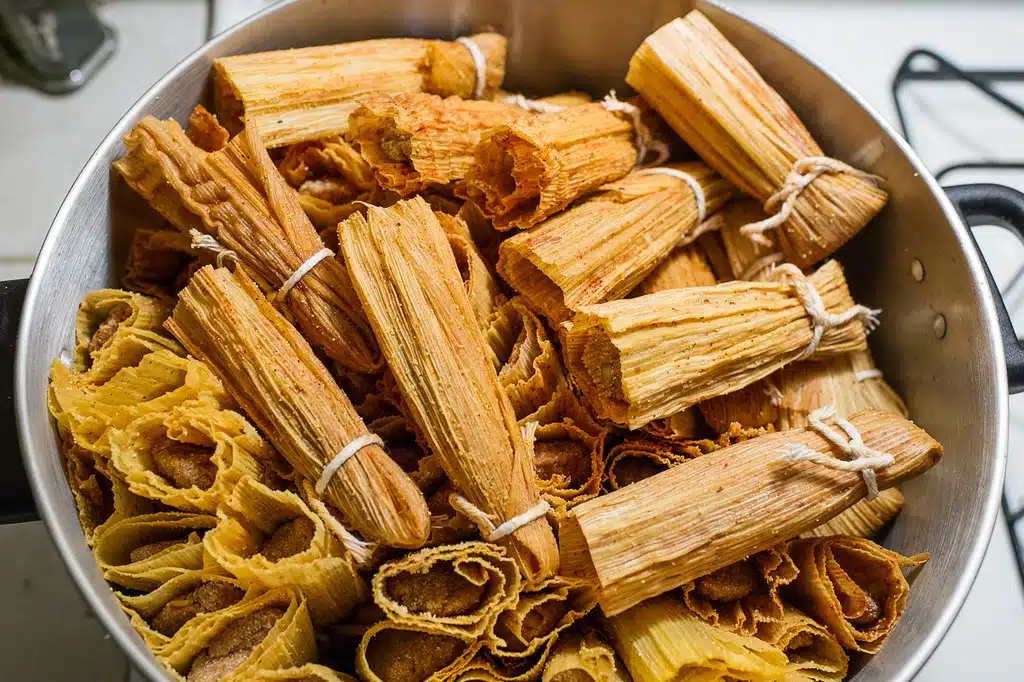
Store tamales in airtight containers or Ziploc bags, vacuum-seal for long-term storage, layer with aluminum foil before freezing, and consider salting and storing in a cool, dry place to extend their shelf life.
Read on to learn more about proper tamale storage techniques!
Airtight Containers or Ziploc Bags
I recommend storing tamales in airtight containers or Ziploc bags to preserve their freshness for an extended period. This method helps protect the tamales from exposure to air and moisture, which can lead to spoilage.
By sealing them tightly, you can maintain their flavor and texture, ensuring that they remain delicious when you’re ready to enjoy them again.
When using airtight containers or Ziploc bags, make sure to remove as much air as possible before sealing them. Press out excess air from the bag before closing it securely, or choose appropriately sized, airtight containers to minimize air exposure.
Vacuum-Sealing
To extend the shelf life of tamales, vacuum-sealing is an excellent method. This process removes air from the packaging and seals it tightly, preventing freezer burn and maintaining the tamales’ freshness.
When vacuum-sealed, cooked tamales can last in the freezer for up to 6 months, while uncooked ones can maintain their quality for even longer periods—typically around 8–12 months.
Vacuum-sealing also helps preserve the flavor and texture of tamales without risking potential contamination or moisture buildup. By removing excess air from the package, you can ensure that your tamales stay fresher for longer periods of time and are ready to be enjoyed whenever you crave them.
Layering with Aluminum Foil Before Freezing
Before freezing tamales, it is essential to ensure that they are well-protected from freezer burn. Layering them with aluminum foil before placing them in an airtight container or Ziploc bag provides an extra barrier against air and moisture, helping to maintain their quality during storage.
This additional layer of protection can help prevent the tamales from drying out and losing their flavor, ultimately extending their lifespan when kept in the freezer.
When wrapping tamales with aluminum foil, be sure to tightly seal the edges to create a secure enclosure. This will help preserve the moisture within the tamales and prevent any unwanted odors from seeping in.
Salting and Storing in A Cool, Dry Place
Salting tamales before storing them helps to enhance their flavor and extend their shelf life. A light sprinkling of salt on the outer husk can prevent the growth of bacteria, preserving the tamales for a few more days.
Additionally, placing the salted tamales in a cool, dry place with good air circulation will help maintain their freshness. This method is not only simple but also effective in keeping your tamales tasting great for an extended period of time.
Storing tamales in a cool, dry place ensures that they remain fresh and free from moisture, which can lead to spoilage. A pantry or cupboard away from direct sunlight is an ideal spot for long-term storage of properly prepared and salted tamales.
Reheating and Using Stored or Cooked Tamales
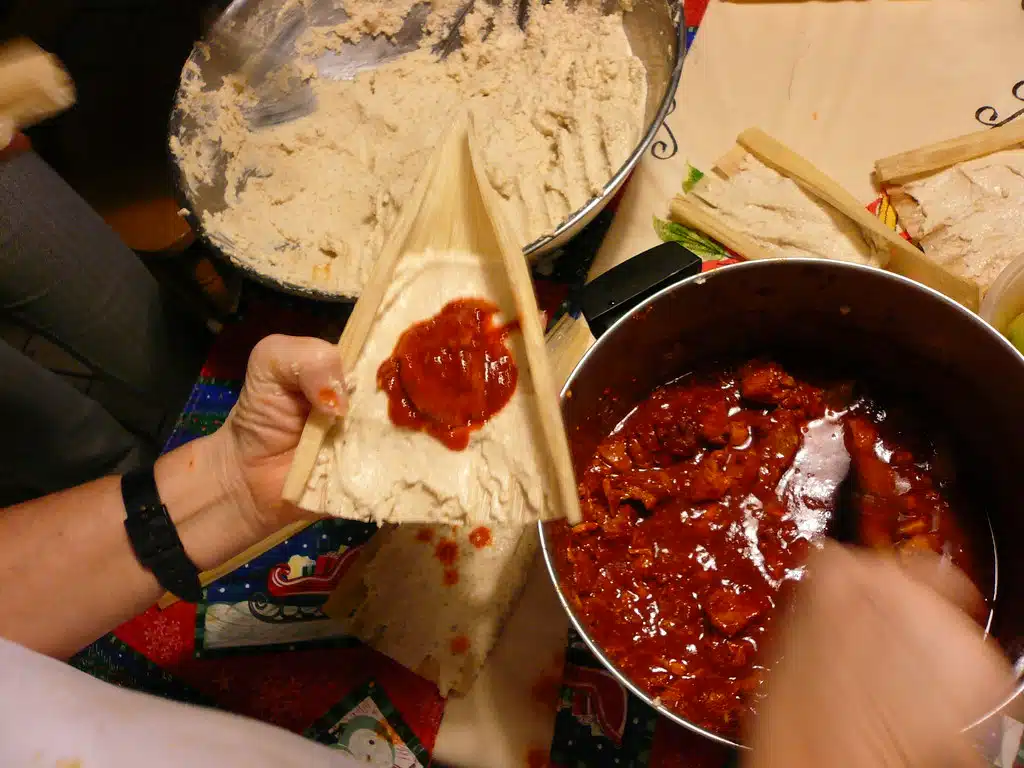
When it comes to reheating and using stored tamales, there are several methods you can use, such as using a steamer, air fryer, rice cooker, microwave, or frying pan. Each method may yield slightly different results in terms of texture and flavor.
Using a Steamer
To reheat tamales using a steamer, fill the bottom of the steamer with water and bring it to a boil. Once boiling, stack the tamales vertically in the steamer basket, ensuring they are not crowded.
Cover the steamer with a lid and let them steam for about 15–20 minutes or until they are thoroughly heated. The steam will help retain moisture and prevent it from drying out.
When reheating multiple batches of tamales, be sure to check that there is enough water in the pot before starting each new batch to avoid scorching or burning. Additionally, if you’re planning on storing leftover tamales after reheating, make sure they have cooled down completely before placing them back in an airtight container to extend their shelf life.
Air fryer
To reheat tamales using an air fryer, preheat the air fryer to 325°F (165°C). Then, place the tamales in the air fryer basket in a single layer and heat them for about 10 minutes, flipping them halfway through.
This method will help restore the crispy texture of the tamale’s exterior while ensuring that the inside is heated evenly. An air fryer is a convenient way to reheat leftover tamales without sacrificing their delicious taste and texture.
Rice Cooker
I use a rice cooker to reheat tamales, ensuring they are evenly heated and retain their moisture. Placing the tamales in the steamer basket, I add about 1/4 cup of water to the pot.
After setting it to “Steam” or “Cook,” I let them warm up for about 15 minutes. This method keeps the tamales from becoming dry and preserves their flavors, making them just as delicious as when they were first made.
Using a rice cooker is an efficient way to reheat tamales while maintaining their quality. With its gentle steam cooking process, the rice cooker provides an even heat distribution that ensures perfect reheating without drying out the tamales.
Microwave
When it comes to reheating tamales, the microwave is a quick and convenient option. Place a single tamale on a microwave-safe dish and cover it with a damp paper towel to prevent drying out.
Heat the tamale on high for 1-2 minutes, turning it halfway through to ensure even heating. If you’re reheating multiple tamales, arrange them in a circle on the plate and heat them for 2-3 minutes, flipping each one over once during cooking.
For uncooked tamales that have been thawed in the refrigerator or brought to room temperature, wrapping them in a damp paper towel before microwaving will help maintain moisture. Be sure to check if they are heated thoroughly before serving by inserting a knife into the center and feeling if it’s hot.
Frying Pan
I reheat tamales using a frying pan. I place the pan on medium heat, add a small amount of oil to it, and then put the tamale in. Moreover, I let it cook for about 3–5 minutes on each side until it’s heated through and has a crispy outer layer.
Using a frying pan provides an alternative method for reheating tamales if you don’t have access to other kitchen appliances. This technique is simple and efficient, making it convenient for quickly enjoying your leftover tamales without compromising their flavor or texture.
Moving on to the next section, let’s delve into how to use a steamer for reheating tamales.
FAQs
How long can you keep tamales fresh in the fridge?
Tamales can stay good for about one week in the fridge if you store them properly to preserve their freshness.
What are some tips for refrigerating tamales to extend their shelf life?
Wrap tamales tightly in plastic wrap or aluminum foil and place them in an airtight container before refrigerating to help keep them fresh longer.
How do I know if my stored tamales have gone bad?
Check your tamales for spoilage indicators like a sour smell, mold growth, or an off texture, which means they’re no longer safe to eat.
Is there a difference between storing cooked and uncooked tamales in the fridge?
Yes! Cooked tamales should be cooled down before storage, while uncooked ones must be wrapped properly; both need refrigeration for food safety but may have different expiration timelines.
Can refrigerating tamales affect their taste or texture when reheated?
Keeping your Tamales cold might slightly change their texture, so follow cooking guidelines closely when reheating to maintain quality and ensure deliciousness.
Conclusion
Tamales can last in the fridge for up to 5 days if properly stored. Using airtight containers or tightly wrapping them helps extend their shelf life. Have you considered trying vacuum-sealing to preserve your tamales? It’s not only practical but also efficient.
Preserving tamales is crucial to maintaining their freshness and flavor. Explore further resources on food preservation methods for an enhanced understanding of prolonging the lifespan of various dishes.
Remember, the key is proper storage from the outset.

